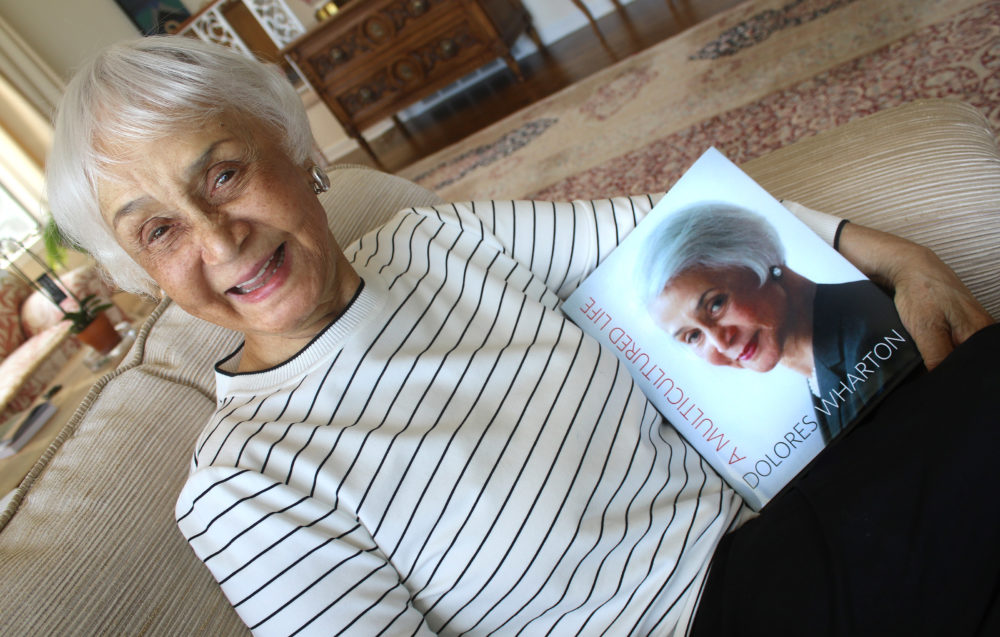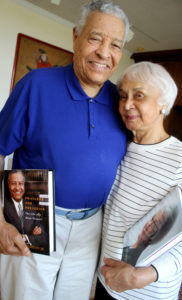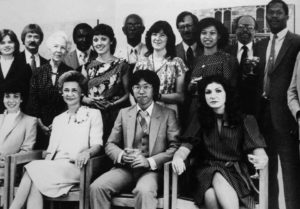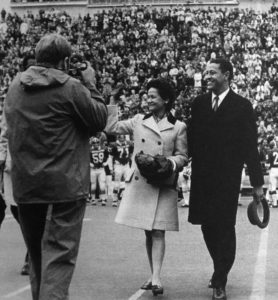DOLORES WHARTON’S ‘MULTICULTURED LIFE’
From Harlem Aristocracy,
She Reached Nation’s Heights

By JIM KEVLIN • Special to www.AllOTSEGO.com

COOPERSTOWN – Lee Brathwaite, a rising executive as NYTel evolved into Verizon, found himself in a tough transition – from operations to sales.

“It was the most challenging transition of my career,” said Brathwaite, now CEO of Apex Construction, a Harlem-based company building commercial and multiple-unit residential structures and a board member for the Golub Company, which operates Price Chopper.
Among other things, in sales, his salary and his team’s paychecks depended on results.
He discovered communications skills – sharpened at Dolores Wharton’s Fund for Corporate Initiatives (FCI) through interactions with other young execs and captains of industry – enabled him to pull his team together, to develop a rapport with clients, and to close deals.
By the end of the second year, his team was routinely winning his corporation’s sales awards.
“It was the best experience of my career,” said Brathwaite, he said of his FCI experience.
As it happens, Wharton – she and husband Clifton R. Wharton Jr., the former SUNY chancellor, have owned a home above Otsego Lake for three decades – considers FCI as the pinnacle of her wide range of achievements.
Chapter 10 in her memoir, “A Multicultured Life,” available Sept. 1 through Michigan State University Press and amazon.com, is her favorite, she said in an interview in anticipation of its publication.
Thinking about it, FCI represents the full blossoming of all her experiences:
- She was born into black high society in Harlem – her father’s prosperous family ran a top funeral home there; one of her mother’s ancestors served in the South Carolina Legislature during Reconstruction – and raised, in part, in Danbury, Conn., where she suffered through her first racial snubs.
- She was introduced to her husband in the Harvard Yard by a cousin at Radcliffe. After he graduated, on the verge of departing for the University of Chicago’s Ph.D. program, they married in Marian Anderson’s studio in Connecticut.
- The couple worked shoulder to shoulder – “we were a team,” says her husband – as he was posted to Malaysia by the Rockefeller Foundation, served as Michigan State University president, then SUNY chancellor in the 1970s and ’80s, modernized TIAA CREF as its CEO and served as deputy secretary of state in the Clinton Administration. “The experiences Clif had professionally opened up new worlds to us,” she said.
- Along the way, companies began to widen their perspectives by recruiting blacks and women to their boards, she was recruited to be a director of Phillips Petroleum, Kellogg, Gannett and several other major companies, where she focused on inclusive hiring, but also brought the fresh perspective of a heretofore outsider. Her husband helped break the ice by joining the spouses’ activities at conferences – he being the only male spouse.
- All of this experience flowered, she believes, in her creating the Fund for Corporate Initiatives while SUNY’s first lady, where she tapped her corporate contacts to introduce young minority, women and even non-minority men to businesspeople, government officials and academics at the top of their game. Dozens, the invited leaders ranged Bill Clinton’s pal and adviser Vernon Jordan, to Commerce Secretary Juanita Kreps, legendary pianist Bobby Short and Union Carbide CEO Bob Kennedy.

FCI participants “had a change to interact with top leadership,” said Dolores Wharton in an interview.
The FCI had three parts. One, a summer intern program that included jobs at such Albany-area enterprises as Ford, Key Bank and the Times Union, with training at the Carey Institute in Rensselaerville.
Two, the Young Executive Program, featuring VIPs, training and discussion at the Aspen Institute in Virginia. Three, an alumni arm, a network of young executives who could advise and support each other as they rose in their professions.
In addition to Brathwaite, who became vice president/regional operations in 24 years at Verizon and still serves on the Golub Company board, alumni included former Xerox CEO Ursula Burns.
The nominees were “high potential people,” said the author’s husband. “It was not giving them money. It was giving them a set of experiences.”
Dolores Wharton was first inspired to try her hand at autobiography in 1993 by Bob Perrin, former MSU vice president and aide to her husband in the State Department. “Dolores, you ought to write it up,” he said. “It’s good story.”
When the couple retired and bought an aerie high above Otsego Lake, her husband began his memoir. “One autobiography at a time is enough,” she said. After his “Privilege & Prejudice” came out in 2015, she returned to her writing, often waking in the wee hours to sit at her desk. “I had memories,” she found, “fond memories of these years.”
Three vignettes.
One, her early education at New York City’s progressive Little Red School House emphasized arts, which led to her interest in the emerging art scene in newly independent Malaysia. “It was especially flattering when a curator from New York’s Metropolitan Museum of Art sought my counsel when stopping over in Kuala Lumpur,” she wrote. In 1971, that grew into her first book, “Contemporary Artist of Malaysia: A Biographic Survey,” a standard for years.

Two, as Michigan State’s first lady, she stood by her husband’s side before howling crowds of Vietnam protesters, and one time in place of her exhausted husband, who was determine not to close the campus. “Will you accept me in his place tonight?” The crowd roared its approval. She reached out to faculty wives and female students, even spending one-week stints as guest-in-residence at women’s dorms; one result was personalizing her office. No problem was to small not to appeal to MSU’s charismatic first lady: One student’s mother called: “My daughter hasn’t written to me in a month.”
Three, moving to Albany, she and her husband decided to create a duplex in the South Tower of the former D&H station – now SUNY headquarters – into the president’s official residence, with a view of the Hudson River on one side and Rockefeller’s Empire State Plaza on another. It was a move that won both praise and criticism. Again, her outreach, including expanding the luncheons for 67 college presidents’ wives to include their husbands, guests and top speakers during the annual conference at The Otesaga, helped smooth internal relations.
There are dozens of such anecdotes in the book.

Retirement in Cooperstown – summering in Cooperstown, wintering at United Nations Plaza in New York City – yields a chapter of particular local interest, with mentions ranging from Jane Forbes Clark to Melissa Manikas, now owner of Cooperstown’s State Farm agency, who helped Dolores’ husband with his research, her hairdresser Kim Potts, and many others.
“As newcomers to the community, we delighted in exploring Cooperstown,” she writes. “…We found classic colonial architecture still conspicuous, with slender white church steeples that peek above rows of wood-framed houses … with broad porches and closely trimmed lawns.”
She served on the Glimmerglass Opera board, convincing Phillips Petroleum to underwrite an NPR broadcast of Mozart’s “Il Re Pastore.” He served on Bassett, NYSHA and the Clark Foundation boards.
She is 92, he is shortly turning 93, they offered during the interview – Team Wharton’s been in place for 67 years.
That love match has inspired many, said Lee Brathwaite.
“On the professional level, they are examples I have always attempted to live up to,” he continued. “On a personal level, they’ve been successful in their marriage. My wife and I strive to emulate their example. We love them dearly.”
He ended with a remark that – having read both her “Multiculture” and his “Privilege” – might be echoed by hundreds of associates from KL to East Lansing to Albany to Washington to Cooperstown. “I can’t thank them enough for what they’ve done for me.”


I love the Whartons. Purchased both of their books. I have looked up to them both growing up.
I am so inspired by the lives of Dr Wharton & Mrs Wharton! As an African I undergraduate student at Michigan State (‘74) during Dr Wharton’s tenure I had no idea how uniquely powerful it was to have him as the 1st African American president of a “major” university! I’m grateful for trailblazers such as Dr Wharton & his wife being an exemplary example of Black excellence! As the Co-founder of a non profit in Detroit we are launching a new project, the “Great Lakes People of Color Water Policy Camp” ( to be operated in the historic Idlewild, Michigan) & the Wharton’s will be honored on our “Wall of Honor” citing Black & POC Achievements! We will also be purchasing both autobiographies to go into our library for the young people! Thank you for the exemplary lives that you both have lived!